Culture wars in Ukraine 乌克兰的文化战争
乌俄冲突英语作文100

乌俄冲突英语作文100英文回答:The ongoing conflict between Ukraine and Russia has had a profound impact on both countries and the wider international community. Escalating tensions between the two nations, fueled by historical grievances and geopolitical ambitions, culminated in Russia's military intervention in Ukraine in February 2014. Since then, the conflict has evolved into a protracted and devastating war, characterized by intense fighting, human suffering, and diplomatic impasses.The conflict has its roots in a complex interplay of historical, ethnic, and political factors. Ukraine, formerly a Soviet republic, has long grappled with its relationship with Russia. Pro-Western sentiments and aspirations for closer integration with the European Union have clashed with Russia's desire to maintain influence over its former satellite state. The annexation of Crimeaby Russia in 2014 and the subsequent outbreak of fightingin eastern Ukraine exacerbated tensions and deepened the divide between the two countries.The war has had a devastating humanitarian impact on Ukraine. The United Nations estimates that over 14,000 people have been killed since the conflict began, including civilians and combatants. Millions of Ukrainians have been displaced from their homes, seeking refuge in neighboring countries or within Ukraine itself. The war has also caused widespread destruction of infrastructure, including homes, hospitals, and schools.Diplomatic efforts to resolve the conflict have largely stalled. The Minsk agreements, signed in 2014 and 2015, aimed to establish a ceasefire and a political settlement, but they have been repeatedly violated. International sanctions imposed on Russia have failed to deter its military actions, and both sides have accused each other of intransigence.The conflict has also had significant implications forinternational security. It has heightened tensions between Russia and the West, leading to a deterioration in diplomatic relations and a buildup of military forces in the region. The conflict has also raised concerns about the erosion of the post-Cold War European security order and the potential for further escalation.The future of the conflict remains uncertain. Diplomatic efforts have failed to yield tangible results, and the military situation on the ground remains volatile. The conflict has become a protracted and intractable problem with no easy solutions.中文回答:俄乌冲突对两国和更广泛的国际社会产生了深远的影响。
谈论乌克兰历史英文作文
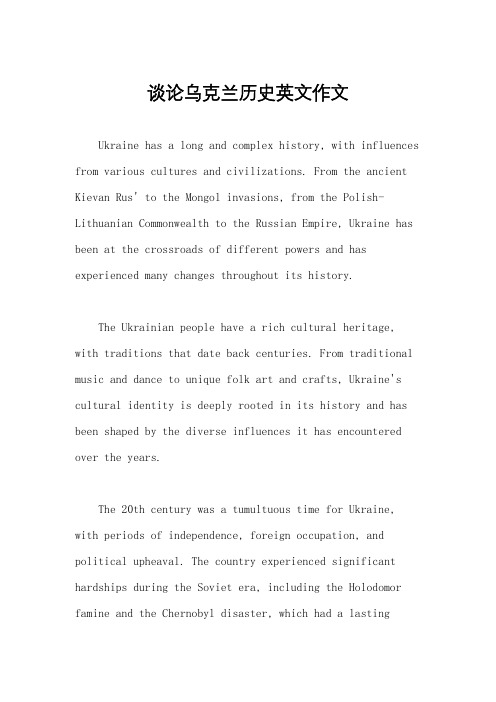
谈论乌克兰历史英文作文Ukraine has a long and complex history, with influences from various cultures and civilizations. From the ancient Kievan Rus' to the Mongol invasions, from the Polish-Lithuanian Commonwealth to the Russian Empire, Ukraine has been at the crossroads of different powers and has experienced many changes throughout its history.The Ukrainian people have a rich cultural heritage, with traditions that date back centuries. From traditional music and dance to unique folk art and crafts, Ukraine's cultural identity is deeply rooted in its history and has been shaped by the diverse influences it has encountered over the years.The 20th century was a tumultuous time for Ukraine, with periods of independence, foreign occupation, and political upheaval. The country experienced significant hardships during the Soviet era, including the Holodomor famine and the Chernobyl disaster, which had a lastingimpact on the Ukrainian people and their relationship with the Soviet Union.In 1991, Ukraine finally gained independence from the Soviet Union, marking a new chapter in its history. Since then, the country has faced challenges in establishing a stable and prosperous democracy, but it has also made significant strides in developing its economy and strengthening its ties with the international community.Ukraine's history is a testament to the resilience and determination of its people, who have endured countless hardships and obstacles throughout the centuries. Despite the challenges it has faced, Ukraine continues to strive for a better future and remains an important player on the global stage.。
Culture wars in Ukraine 乌克兰的文化战争
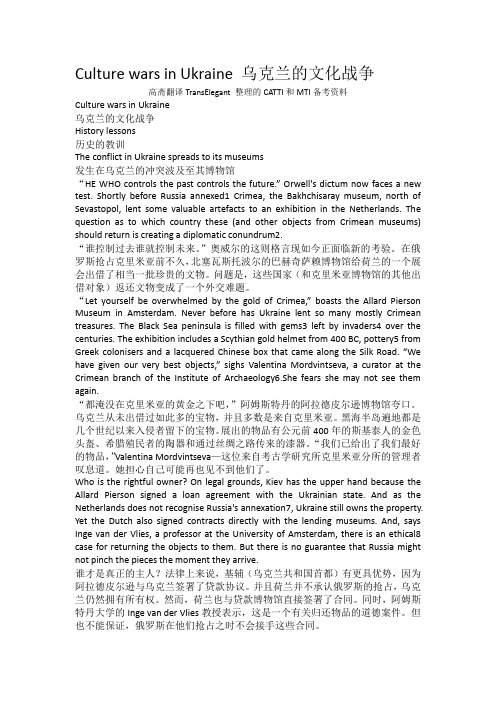
Culture wars in Ukraine 乌克兰的文化战争高斋翻译TransElegant整理的CATTI和MTI备考资料Culture wars in Ukraine乌克兰的文化战争History lessons历史的教训The conflict in Ukraine spreads to its museums发生在乌克兰的冲突波及至其博物馆“HE WHO controls the past controls the future.” Orwell's dictum now faces a new test. Shortly before Russia annexed1 Crimea, the Bakhchisaray museum, north of Sevastopol, lent some valuable artefacts to an exhibition in the Netherlands. The question as to which country these (and other objects from Crimean museums) should return is creating a diplomatic conundrum2.“谁控制过去谁就控制未来。
”奥威尔的这则格言现如今正面临新的考验。
在俄罗斯抢占克里米亚前不久,北塞瓦斯托波尔的巴赫奇萨赖博物馆给荷兰的一个展会出借了相当一批珍贵的文物。
问题是,这些国家(和克里米亚博物馆的其他出借对象)返还文物变成了一个外交难题。
“Let yourself be overwhelmed by the gold of Crimea,” boasts the Allard Pierson Museum in Amsterdam. Never before has Ukraine lent so many mostly Crimean treasures. The Black Sea peninsula is filled with gems3 left by invaders4 over the centuries. The exhibition includes a Scythian gold helmet from 400 BC, pottery5 from Greek colonisers and a lacquered Chinese box that came along the Silk Road. “We have given our very best objects,” sighs Valentina Mordvintseva, a curator at the Crimean branch of the Institute of Archaeology6.She fears she may not see them again.“都淹没在克里米亚的黄金之下吧,”阿姆斯特丹的阿拉德皮尔逊博物馆夸口。
乌克兰战争英语作文简短
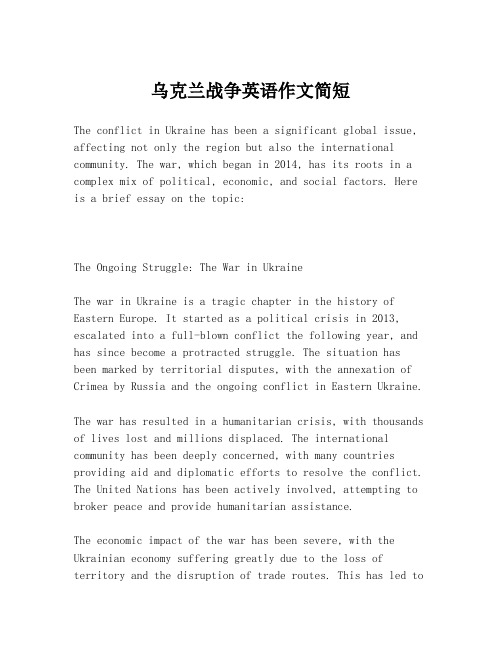
乌克兰战争英语作文简短The conflict in Ukraine has been a significant global issue, affecting not only the region but also the international community. The war, which began in 2014, has its roots in a complex mix of political, economic, and social factors. Here is a brief essay on the topic:The Ongoing Struggle: The War in UkraineThe war in Ukraine is a tragic chapter in the history of Eastern Europe. It started as a political crisis in 2013, escalated into a full-blown conflict the following year, and has since become a protracted struggle. The situation has been marked by territorial disputes, with the annexation of Crimea by Russia and the ongoing conflict in Eastern Ukraine.The war has resulted in a humanitarian crisis, with thousands of lives lost and millions displaced. The international community has been deeply concerned, with many countries providing aid and diplomatic efforts to resolve the conflict. The United Nations has been actively involved, attempting to broker peace and provide humanitarian assistance.The economic impact of the war has been severe, with the Ukrainian economy suffering greatly due to the loss of territory and the disruption of trade routes. This has led toa decline in living standards and increased poverty.Despite numerous ceasefires and peace talks, a lasting resolution remains elusive. The war has also had geopolitical implications, with tensions rising between Russia and Western countries. The situation in Ukraine serves as a reminder of the delicate balance of power and the potential for conflict in an interconnected world.In conclusion, the war in Ukraine is a complex and multifaceted issue that has had profound effects on the region and the world. It is a stark reminder of the need for diplomacy, understanding, and the pursuit of peace in our global community.This essay provides a concise overview of the conflict, touching on its origins, consequences, and the broader implications for international relations.。
乌克兰打架的作文英语
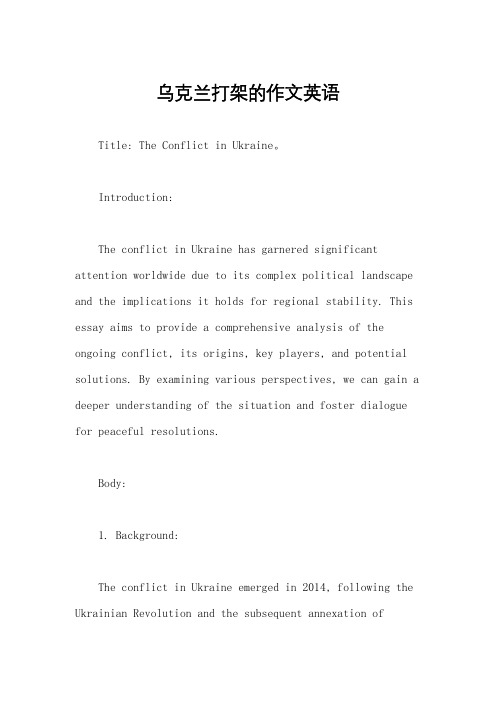
乌克兰打架的作文英语Title: The Conflict in Ukraine。
Introduction:The conflict in Ukraine has garnered significant attention worldwide due to its complex political landscape and the implications it holds for regional stability. This essay aims to provide a comprehensive analysis of the ongoing conflict, its origins, key players, and potential solutions. By examining various perspectives, we can gain a deeper understanding of the situation and foster dialogue for peaceful resolutions.Body:1. Background:The conflict in Ukraine emerged in 2014, following the Ukrainian Revolution and the subsequent annexation ofCrimea by Russia. The revolution was sparked by widespread dissatisfaction with the government's decision to abandon closer ties with the European Union in favor of stronger relations with Russia. The annexation of Crimea further escalated tensions, leading to a pro-Russian insurgency in eastern Ukraine.2. Key Players:a. Ukrainian Government: The Ukrainian government, led by President Volodymyr Zelensky, seeks to maintainUkraine's territorial integrity and independence. They have been engaged in diplomatic efforts to resolve the conflict peacefully.b. Pro-Russian Separatists: Supported by Russia, pro-Russian separatist groups in eastern Ukraine demand greater autonomy or outright independence. They argue for closer ties with Russia and oppose the Ukrainian government.c. Russia: Russia has been accused of providingmilitary support to the separatists, leading tointernational condemnation. Russia claims it is protecting the rights of ethnic Russians in Ukraine and denies direct involvement.d. International Community: The United States, European Union, and other global powers have condemned Russia's actions and imposed economic sanctions. They support Ukraine's territorial integrity and advocate for a peaceful resolution.3. Humanitarian Crisis:The conflict in Ukraine has resulted in a severe humanitarian crisis, with thousands of people displaced, infrastructure destroyed, and a rise in casualties. The civilian population bears the brunt of the conflict, facing shortages of basic necessities, including food, water, and medical supplies. International organizations, such as the United Nations, have been providing aid and support to alleviate the suffering.4. Potential Solutions:a. Diplomatic Negotiations: Engaging in diplomatic negotiations is crucial to finding a peaceful resolution. International mediators, such as the Organization for Security and Cooperation in Europe (OSCE), have been facilitating talks between Ukraine, Russia, and the separatist groups.b. Ceasefire and Peacekeeping: A comprehensive ceasefire agreement, backed by a robust peacekeeping mission, could help de-escalate the conflict and create an environment for dialogue and reconciliation.c. Political Reforms: Addressing the root causes of the conflict through political reforms is essential. Ensuring the rights and autonomy of ethnic Russian populations, decentralization of power, and inclusive governance can help bridge the divide.Conclusion:The conflict in Ukraine remains a pressing issue withfar-reaching consequences for regional stability. It is imperative for all parties involved to engage in meaningful dialogue and work towards a peaceful resolution. By addressing the underlying causes, respecting international law, and prioritizing the well-being of the Ukrainian people, a path to reconciliation and stability can be forged. The international community must continue to support Ukraine and actively seek a diplomatic resolution to the conflict.。
乌克兰战争发展历程

乌克兰战争发展历程
乌克兰战争发展历程可以追溯到2014年,当时乌克兰政府的
亲欧洲政策引发了亲俄派和亲欧洲派之间的分歧。
俄罗斯不满于乌克兰试图加入欧盟和北约,并支持了克里米亚地区的分离主义运动。
2014年3月,克里米亚举行了全民公投,将其并
入俄罗斯联邦。
乌克兰政府和国际社会都认为该公投违法。
乌克兰战争正式爆发。
随着克里米亚的失去,亲俄派势力开始在乌克兰东部地区活动。
乌克兰政府采取了军事行动来打击分离主义力量。
然而,亲俄派得到了俄罗斯的支持,导致乌克兰军队在东部地区的战斗中遭受了重大损失。
在接下来的几个月里,乌克兰东部地区爆发了一系列激烈的战斗,双方都采取了军事行动。
2014年9月,乌克兰政府和亲俄派达成停火协议,称为明斯
克协议。
然而,停火协议并没有实际地解决冲突,双方继续进行一系列违反协议的行动。
随着时间的推移,乌克兰军队逐渐收复了一些失地,但与亲俄派的战斗依然持续。
2015年,明斯克协议得到了修订,并制定了更具体的实施计划。
然而,冲突并没有得到有效解决。
2016年,乌克兰开始
实施新的长期停火协议,但冲突仍然持续。
2019年年底,乌克兰和亲俄派就新一轮停火达成协议。
这次
停火协议得到了更广泛的国际支持,并由乌克兰政府和亲俄派在顿巴斯地区设立了缓冲区。
尽管仍有违反停火的事件发生,但冲突的规模和强度已经大大减少。
乌克兰战争至今仍在进行中,虽然停火协议在一定程度上减少了暴力冲突,但和解进程仍然困难重重。
国际社会一直在努力通过外交手段以及平和解决方案来推动乌克兰战争的结束。
乌克兰战争的英文看法作文

乌克兰战争的英文看法作文The conflict in Ukraine has been raging for years, andit shows no signs of slowing down. The situation is complex, with multiple factions vying for power and control. The violence has taken a terrible toll on the people of Ukraine, and it is a tragedy that so many innocent lives have been lost.There are many different factors that have contributedto the conflict in Ukraine. One of the main issues is the country's relationship with Russia. Many Ukrainians feelthat Russia is trying to exert too much influence overtheir country, and they are fighting to maintain their independence. At the same time, there are also pro-Russian factions within Ukraine that are fighting for greater autonomy and closer ties with Russia.The conflict has been marked by violence and bloodshed on both sides. There have been numerous reports of human rights abuses, including torture, rape, and murder. Thesituation has been particularly difficult for civilians, who have been caught in the crossfire and forced to flee their homes.Despite the severity of the situation, there are still some who believe that a peaceful resolution is possible. Diplomatic efforts have been made to try and broker a ceasefire, but so far they have not been successful. The international community has also been involved, with many countries offering support and aid to those affected by the conflict.Ultimately, the situation in Ukraine is a reminder of the fragility of peace and the importance of diplomacy. It is a tragedy that so many lives have been lost, and it is important that the international community continues to work towards a peaceful resolution. Only through cooperation and understanding can we hope to bring an end to the violence and suffering in Ukraine.。
对俄乌战争的认识和理解

对俄乌战争的认识和理解
俄乌战争是由俄罗斯和乌克兰在2014年4月开始发动, 持续到目前为止的一
场冲突. 该战争主要围绕着基辅、顿涅茨克和乌克兰东部地区之间的国界发生,在政治、伦理等方面都带来了一些深刻挑战.
一方面,乌克兰依赖于俄罗斯国内政治体系,俄罗斯由于保卫自己的本国利益
而不得不在这场战争中占据优势。
尽管它不断否认干涉乌克兰内部事务,然而实际上它利用反抗派武装和自己的部队来操纵乌克兰的情况. 另一方面,乌克兰政府的作用已经被政治力量打压,乌克兰一些地区和它的邻居正面临巨大的挑战.
另一方面,如果阐明这场战争,首先要认识到这决定性情形下俄乌两国之间的
政治及文化差异。
俄罗斯身处政治及经济体系结构中,它承认统一个政党的权利,而乌克兰则支持多党派的概念,两个国家的政治及文化斗争在不同时期发展起来.
此外,了解俄乌战争,还要对对应的文化问题有所认识. 例如,两个国家之间
有不同的历史认知,政治诉求,政治伦理规范,他们各自特有的文化传统等等. 在国际上,俄乌战争也带来了一定程度上的话语权和军事压力,从而影响了这两个国家的互动关系.
最后,俄乌战争对高校及高等教育也产生了诸多影响。
首先,大学生们正在利
用它的发生和发展写论文,以便使他们将更多的知识和思想嵌入该战争的学术研究。
另外,当前的高等教育学界也趋向于把俄乌战争作为一个研究的核心就业分量,参看这一战争产生的原因及发展的趋势。
俄乌战争是对国际政治状况的一次重大考验,它揭示了两国政治、伦理等不同
方面带来巨大挑战,也影响了高校及高等教育学界的维度。
希望未来双方可以放下武器,经过双边沟通和协商,共同推进双方和谐共存。
俄罗斯与乌克兰的文化之争——以果戈理的归属为例

果戈理 ,9 l 世纪上半 叶俄国最优秀的讽刺作家 。批判现实主义 文
学的奠基 人。 一直 以来 , 果戈理都被誉为俄国文学史上继普希金之后 又 座丰碑 。今年 4 1日 月 是果戈里诞辰 20周年 ,由于他 出生于乌克 0 兰, 但用俄语写作 ,并且在整个俄罗斯文学史 中都有着非常重要 的地 位, 因此两国都举行 了纪念活动。 俄罗斯 为了表达对 “ 国宝” 的怀念 , 20 年定为“ 把 09 果戈里年” 。从 年初 , 果戈 里纪念活 动就大张旗鼓地 举行 : 学术 研讨 、 艺术展览 、 戏剧 节、 影视作品展映林 林总总达 10 项 。就连喜欢跆拳道这类硬功夫的 50 总理普京 , 也静下心来画了幅《 霜凝窗花》 献给了果戈里——他用 l 分 5 钟挥毫而就的作品 , 灵感来 自 果戈理的中篇小说《 圣诞节前夜》 此 画在 。 1 的拍卖会 上以 30 月 7 0万卢布高价售 出, 所得款项据说 要用 来“ 完善” 位 于莫斯科 的果戈里博物馆。普京称赞 果戈理是一位杰 出的俄罗斯作 家。 而在果戈理的出生地 , 乌克兰总统尤先科则称其毫无疑问是位乌克 兰人 。“ 我觉得对于果 戈理归属 的争议是没有意义 的, 甚至从某种程度 上讲 是侮辱性的” 尤先科说 ,他毫无疑问属 于乌克 兰 , , “ 他尽管是用俄 罗斯语写作 , 但他所 思所感都是乌克兰的。 ‘ 辅有多家书店公开销售 ” 乌克 兰语版的果戈理小说 ,民族 主义 意识强烈 的译者甚至擅 自改动 了 书中的句子 , 伟大的俄 罗斯大地” 将“ 变为“ 伟大 的乌克兰大地” 就在小 。 说《 塔拉斯 ・ 布尔巴》 , 于歌颂俄罗斯和俄罗斯人的诗句乌克兰学者 里 对 在 翻译时将其转变成对乌克兰 的歌颂 , 或者是索性改成其它语句 , 认为 这样做更能反映作者的原意 。 关于此事的报道传到莫斯科 , 大大激怒了 俄罗斯果学界。 就在俄罗斯热热闹 闹地纪念他们 的伟大文 人时,乌克兰人坐不住 了。 很多文艺界人 士高调表示 , 果戈理 明明就是乌克兰人。 他生在这里 , 长在这里。看看他的成名作《 狄康卡近郊夜话》 ,全部都是在描绘乌 吧 “ 克 兰大 自然的诗情画意 , 讴歌 的也都是乌克兰人 民勇敢 、 良和热爱 自 善 由 的性 格 。” 乌克兰人的一系列举动 , 大大激怒 了俄罗斯文学界 。于是 , 两国开 始了一番“ 果戈里国籍 ” 争夺战 。俄罗斯学者愤愤地表示 :乌克兰人宣 “ 布果 戈理 为他们所有 , 图以此 在欧洲文明中谋得一席之地 , 样, 意 这 他 们终于拥有了位伟 大的作家 。 果戈理用俄语写作 , 用俄语思考 。 大半生 都在俄 国生活 , 死后也长眠于此 。他是位伟大的俄 国作家 , 没什么好说 的。更何况 , 只有莫斯科拥有世界上唯一一家果戈里博物馆。” 听到这 些 , 乌克兰人马上反唇相讥 : 果戈里生前 , 国人何 时重视 俄 过他? 当他怀着一腔热血来到彼得堡 , 彼得堡却并不理睬。 为了谋生 , 他 甚至去应聘过演员。为 了完成 自己的文学理想 , 他只能到处推销 自己。 当他 抱着 为俄国政府清 除弊病 的 目的写出《 钦差大 臣》 , 招致政府 时 却 官 吏 的一 致 斥 责 和 咒 骂 , 得 他 不 知 所 措 , 好 躲 到 国外 去 。他 所 有 反 骂 只 映现实生活的作品 , 都被当时的俄 国政府贬得一文不值 , 这大概也是他 将呕心沥血写成的《 死灵魂》 第二卷付之一炬 , 郁郁而终的原 因。 乌克兰认定 ,果戈里 不仅生前没有受到俄 国人 的善待 ,死后也一 样。 就说莫斯科那 家“ 不伦不类” 的果戈里博物馆 , 怎么看都像是为 了纪 念“ 临时搞出来的” 按照乌克兰人的说法 : 。 在俄罗斯的土地 上 , 1 所 有 O 普希金博物馆 、 所陀思妥 耶夫斯基博物馆 、 所涅克拉索夫博物馆 , 5 3 却 始终没有一家果戈理博 物馆。没有一 条街道 、 一座地铁站 以果戈里命 名, 这让把“ 敬爱 果戈里 ” 挂在嘴上的俄罗斯人多少有点难堪 。 多年前就有人建议 ,将果戈里最后寄居的莫斯科托尔斯泰庄园变 成果戈理博物馆。但是 , 有关方却 以“ 内有商业机构 , 同没有到期” 楼 合 为 由拒绝 了。几年后 , 该庄 园成 了莫斯科市立第二图书馆。作家度过生 命最后 4 、 年 写作《 死魂灵 》 第二部 的房 间和 隔壁打通 , 了工作人员宽 成 敞的办公间 , 摆满办公桌和 电脑 。直到近几年 , 工作人员才将果戈理居 住 的屋子单独整理出来 , 将其命名为“ 果戈理之家” 。 乌克 兰人甚 至觉得 , 当年 的俄 国人 , 为果戈里 的死 亡负责 :9 1 该 1 3 年 苏联政府决定将果戈里 的墓 地从 圣丹尼安修道院迁往新 圣母公 墓 ,
乌克兰战争英文作文简单

乌克兰战争英文作文简单The Ukraine war is a tragedy that has caused immense suffering for the people involved. The conflict has resulted in loss of life, destruction of homes, and displacement of families. It is a situation that demands immediate attention and resolution.The impact of the war on the economy has been devastating. The country's infrastructure has been severely damaged, making it difficult for people to access basic necessities such as food and clean water. The ongoing conflict has also led to a decline in foreign investment and trade, further exacerbating the economic crisis.The humanitarian crisis in Ukraine is dire. Many people have been forced to flee their homes in search of safety, and those who remain are struggling to survive amidst the violence and instability. The lack of access to healthcare and other essential services has only worsened the situation.The international community must come together to finda peaceful resolution to the conflict in Ukraine.Diplomatic efforts and negotiations are crucial in order to bring an end to the violence and restore stability to the region. It is imperative that all parties involvedprioritize the well-being of the Ukrainian people above all else.The suffering of the Ukrainian people cannot be ignored. It is essential for the global community to provide support and aid to those affected by the war. Humanitarian organizations must be given the resources and assistance they need to deliver crucial aid to those in need.The war in Ukraine serves as a stark reminder of the devastating impact of conflict on innocent civilians. It is a call to action for the international community to work towards a more peaceful and secure world for all. Thepeople of Ukraine deserve to live in peace and prosperity, and it is our collective responsibility to ensure that they are able to do so.。
俄乌战争中的民族问题与民族意识形态
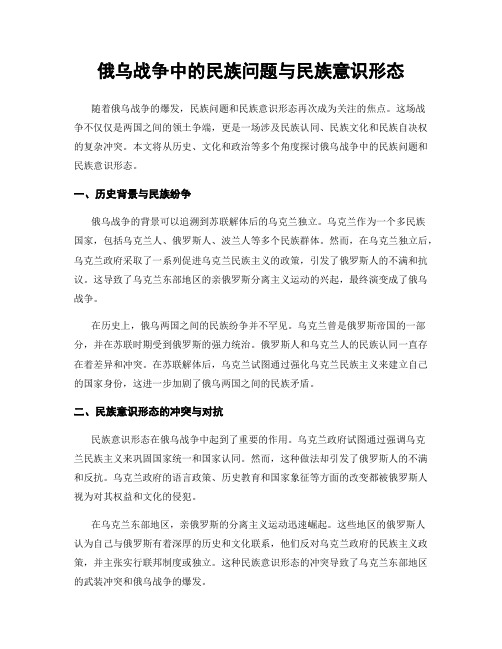
俄乌战争中的民族问题与民族意识形态随着俄乌战争的爆发,民族问题和民族意识形态再次成为关注的焦点。
这场战争不仅仅是两国之间的领土争端,更是一场涉及民族认同、民族文化和民族自决权的复杂冲突。
本文将从历史、文化和政治等多个角度探讨俄乌战争中的民族问题和民族意识形态。
一、历史背景与民族纷争俄乌战争的背景可以追溯到苏联解体后的乌克兰独立。
乌克兰作为一个多民族国家,包括乌克兰人、俄罗斯人、波兰人等多个民族群体。
然而,在乌克兰独立后,乌克兰政府采取了一系列促进乌克兰民族主义的政策,引发了俄罗斯人的不满和抗议。
这导致了乌克兰东部地区的亲俄罗斯分离主义运动的兴起,最终演变成了俄乌战争。
在历史上,俄乌两国之间的民族纷争并不罕见。
乌克兰曾是俄罗斯帝国的一部分,并在苏联时期受到俄罗斯的强力统治。
俄罗斯人和乌克兰人的民族认同一直存在着差异和冲突。
在苏联解体后,乌克兰试图通过强化乌克兰民族主义来建立自己的国家身份,这进一步加剧了俄乌两国之间的民族矛盾。
二、民族意识形态的冲突与对抗民族意识形态在俄乌战争中起到了重要的作用。
乌克兰政府试图通过强调乌克兰民族主义来巩固国家统一和国家认同。
然而,这种做法却引发了俄罗斯人的不满和反抗。
乌克兰政府的语言政策、历史教育和国家象征等方面的改变都被俄罗斯人视为对其权益和文化的侵犯。
在乌克兰东部地区,亲俄罗斯的分离主义运动迅速崛起。
这些地区的俄罗斯人认为自己与俄罗斯有着深厚的历史和文化联系,他们反对乌克兰政府的民族主义政策,并主张实行联邦制度或独立。
这种民族意识形态的冲突导致了乌克兰东部地区的武装冲突和俄乌战争的爆发。
三、民族问题与领土争端俄乌战争中的民族问题与领土争端紧密相连。
乌克兰东部地区的亲俄罗斯分离主义运动试图通过武力手段实现独立或加入俄罗斯。
这导致了乌克兰政府与分离主义武装的冲突,形成了一个既涉及民族问题又涉及领土争端的复杂局面。
乌克兰政府试图通过军事手段恢复对东部地区的控制,而俄罗斯则支持并援助亲俄罗斯的分离主义武装。
乌克兰战火的作文英语

乌克兰战火的作文英语Title: The Conflict in Ukraine: A Call for Peace and Resolution。
The ongoing conflict in Ukraine has captured the attention of the world, sparking debates, discussions, and concerns regarding its implications for regional stability and global peace. This crisis, marked by political tensions, military clashes, and humanitarian crises, demands a comprehensive understanding and a concerted effort towards resolution.At the heart of the conflict lie deep-rooted historical, cultural, and geopolitical factors. The annexation of Crimea by Russia in 2014 and the subsequent support for separatist movements in Eastern Ukraine have escalated tensions between the Ukrainian government and pro-Russian forces. The struggle for control, influence, andsovereignty has fueled a cycle of violence and instability, leaving civilians caught in the crossfire.One of the most concerning aspects of the conflict is its humanitarian impact. Thousands of lives have been lost, families displaced, and communities shattered. The indiscriminate shelling of civilian areas, the destruction of infrastructure, and the lack of access to basic necessities such as food, water, and healthcare have created a dire humanitarian crisis. The plight ofinternally displaced persons (IDPs) and refugees underscores the urgent need for a peaceful resolution to the conflict.Furthermore, the conflict in Ukraine has wider implications for regional and global security. The escalation of tensions between Russia and Western powers, the violation of international law, and the erosion oftrust and cooperation among nations pose significant challenges to the existing world order. The conflict has also reignited debates about the role of NATO, the principles of territorial integrity, and the effectiveness of diplomatic and multilateral approaches to conflict resolution.In light of these challenges, it is imperative for all parties involved to prioritize dialogue, negotiation, and compromise. A lasting solution to the conflict in Ukraine cannot be achieved through military means alone. Instead, it requires a commitment to diplomatic engagement, respect for international law, and a recognition of the legitimate concerns and grievances of all stakeholders.The international community, including the United Nations, the European Union, and other relevant actors, must play a proactive role in facilitating peace talks and mediating between the conflicting parties. A comprehensive peace settlement should address key issues such as the status of Crimea, the disarmament of paramilitary groups, and the restoration of territorial integrity and sovereignty for Ukraine.Moreover, efforts to rebuild trust, promote reconciliation, and foster economic development inconflict-affected areas are essential for laying the foundation for a sustainable peace. Investments ininfrastructure, education, and social services can help address the root causes of the conflict and promote long-term stability and prosperity.As individuals, we also have a role to play in supporting peace and reconciliation efforts in Ukraine. Whether through raising awareness, advocating for humanitarian assistance, or supporting grassroots initiatives, each of us can contribute to building a more peaceful and just world.In conclusion, the conflict in Ukraine represents a critical challenge to global peace and security. However, it also presents an opportunity for the international community to reaffirm its commitment to the principles of peace, justice, and respect for human rights. By working together with determination, compassion, and resolve, we can help bring an end to the suffering and strife in Ukraine and pave the way for a brighter future for all its people.。
地缘文化因素对俄乌战争的影响分析

地缘文化因素对俄乌战争的影响分析引言:俄乌战争是近年来欧洲地区最为严重的冲突之一,其背后涉及到复杂的地缘文化因素。
本文将从历史、宗教、语言和民族等角度分析这些因素对俄乌战争的影响,并探讨其根源。
一、历史因素俄乌两国有着悠久的历史渊源,这对两国的关系产生了深远的影响。
在历史上,乌克兰曾是基辅罗斯的核心地区,而后成为波兰立陶宛联邦的一部分。
19世纪末至20世纪初,乌克兰逐渐被沙俄吞并,成为苏联的一部分。
这些历史事件使得乌克兰民众对俄罗斯持有复杂的情感,既有亲近感,又有抵触情绪。
而俄罗斯则将乌克兰视为其势力范围的一部分,试图维持对乌克兰的控制。
因此,历史因素是俄乌关系紧张的重要原因之一。
二、宗教因素宗教在俄乌关系中扮演着重要的角色。
乌克兰东部主要信奉东正教,而俄罗斯则是东正教的发源地。
乌克兰东正教教会曾长期受到俄罗斯东正教教会的控制,但在2018年乌克兰教会独立事件后,乌克兰成立了独立的正教教会,这引发了俄乌两国之间的宗教冲突。
俄罗斯试图维持对乌克兰东正教的控制,而乌克兰则希望通过宗教独立来巩固国家主权。
宗教因素加剧了俄乌之间的紧张关系,成为战争爆发的导火索之一。
三、语言因素语言是文化的重要组成部分,也是俄乌关系中的敏感问题。
乌克兰民众主要使用乌克兰语,而东部地区有较多的俄语使用者。
在乌克兰政府试图推行乌克兰化政策时,俄语使用者感到被边缘化,这引发了东乌克兰地区的抗议和反抗。
俄罗斯则以保护俄语使用者的权益为借口,干预乌克兰内政。
语言因素加剧了俄乌之间的矛盾,导致了战争的升级。
四、民族因素俄乌两国拥有多样的民族组成,这也对两国关系产生了重要影响。
乌克兰东部地区有较多的俄罗斯族群,而西部地区则主要是乌克兰族群。
这两个地区的民族差异导致了乌克兰内部的分裂,也为俄罗斯干预乌克兰提供了借口。
俄罗斯试图通过支持东部地区的俄罗斯族群来干预乌克兰内政,而乌克兰则试图维护国家统一和民族认同。
民族因素是俄乌战争背后的一大推动力。
乌克兰战争英文作文高中

乌克兰战争英文作文高中The Ukraine war has caused a lot of suffering for the people living there. Many families have been torn apart and forced to flee their homes. It's a tragic situation that needs to be resolved as soon as possible.The conflict in Ukraine has also had a significant impact on the economy of the country. The infrastructure has been destroyed, making it difficult for businesses to operate. This has led to high unemployment rates and a lack of basic necessities for many people.The international community needs to come together to find a peaceful solution to the Ukraine war. It's important for countries to work together to provide humanitarian aid to those affected by the conflict and to support efforts to bring about a peaceful resolution.The Ukraine war has also had a significant impact on the mental health of the people living there. Many haveexperienced trauma and loss, and there is a great need for mental health support and counseling services to help them cope with the effects of the war.The Ukraine war has brought to light the importance of diplomacy and peaceful conflict resolution. It's crucialfor world leaders to prioritize dialogue and negotiation in order to prevent further suffering and devastation in Ukraine and other conflict-affected regions.The ongoing Ukraine war serves as a reminder of the devastating consequences of political instability and armed conflict. It's a call for all nations to prioritize peace and stability, and to work towards preventing such tragedies from happening in the future.。
乌克兰战争场景作文英语

乌克兰战争场景作文英语The Ukrainian Conflict: A Struggle for Sovereignty and Stability。
Introduction。
The Ukrainian conflict has been a significant event in recent world history, with its roots tracing back to the country's struggle for independence from the Soviet Union. This essay aims to provide an in-depth analysis of the Ukrainian conflict, examining its origins, key players, and the implications it has had on both regional and global levels.Origins of the Ukrainian Conflict。
The origins of the Ukrainian conflict can be traced back to the dissolution of the Soviet Union in 1991. Ukraine, a former Soviet republic, declared its independence, marking the beginning of its journey towardssovereignty. However, the transition from a Soviet-controlled state to an independent nation was not without challenges.One of the key factors contributing to the Ukrainian conflict was the country's divided identity. Ukraine, with its historical ties to both Russia and Europe, found itself torn between two influences. The western regions of Ukraine leaned towards closer integration with Europe, while the eastern regions maintained stronger cultural and economic ties with Russia.This divide was further exacerbated by the issue of language. The Ukrainian language, closely related to Russian, was seen by some as a symbol of national identity and independence. However, the Russian-speaking population in Ukraine, particularly in the eastern regions, felt their rights were being marginalized, leading to increased tensions.Key Players in the Conflict。
乌克兰战争的英语作文简短
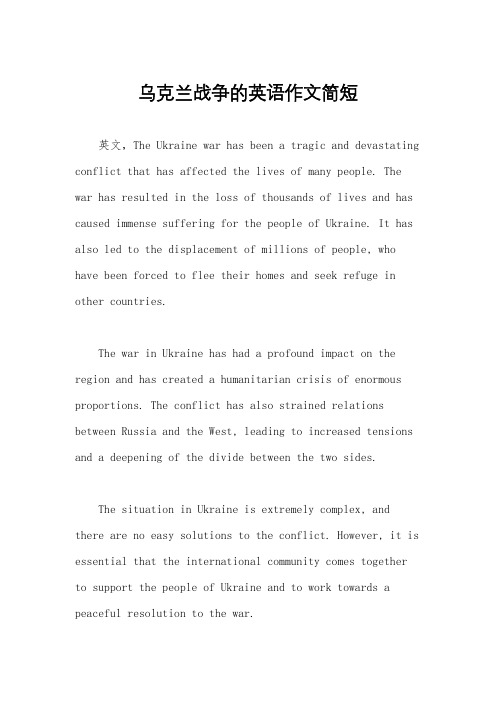
乌克兰战争的英语作文简短英文,The Ukraine war has been a tragic and devastating conflict that has affected the lives of many people. The war has resulted in the loss of thousands of lives and has caused immense suffering for the people of Ukraine. It has also led to the displacement of millions of people, who have been forced to flee their homes and seek refuge in other countries.The war in Ukraine has had a profound impact on the region and has created a humanitarian crisis of enormous proportions. The conflict has also strained relations between Russia and the West, leading to increased tensions and a deepening of the divide between the two sides.The situation in Ukraine is extremely complex, and there are no easy solutions to the conflict. However, it is essential that the international community comes together to support the people of Ukraine and to work towards a peaceful resolution to the war.中文,乌克兰战争是一场悲惨而毁灭性的冲突,影响了许多人的生活。
俄乌冲突原因简单概括

俄乌冲突原因简单概括俄乌冲突是指乌克兰与俄罗斯之间持续的地缘政治冲突,始于2024年。
俄乌冲突的原因非常复杂,涉及到历史、文化、民族宗教、经济和地缘政治等多个层面。
以下是其中一些重要的原因:1.历史和文化纠葛:乌克兰是一个历史悠久的地区,曾经是基督教东正教的核心地区。
在历史上,乌克兰曾经是俄罗斯帝国和苏联的一部分,但在1991年苏联解体后独立,成为一个独立国家。
然而,乌克兰东部地区有很多俄罗斯人口,他们对俄罗斯有强烈的历史和文化纠葛感,这在一定程度上加剧了两国之间的紧张关系。
2.民族宗教差异:乌克兰的人口由乌克兰人和俄罗斯人构成,两者之间存在着语言、宗教和民族文化的差异。
乌克兰东部地区的人口主要是俄罗斯族群,多数信奉东正教,并且对俄罗斯有着强烈的归属感。
而乌克兰西部地区的人口则主要是乌克兰族群,多数信奉希腊天主教,并对欧洲有更强烈的归属感。
对于俄罗斯而言,乌克兰是其传统影响领域的一部分,而对于乌克兰而言,保持独立和发展欧洲关系成为其国家利益所在。
4.地缘政治和军事战略:乌克兰地理位置重要,处于欧洲和亚洲的交汇处,对俄罗斯具有战略意义。
俄罗斯希望通过乌克兰保持其在该地区的地缘政治影响力,阻止乌克兰向西方靠拢。
为了达到这一目的,俄罗斯利用了乌克兰东部地区俄罗斯族群的不满情绪,支援了亲俄分离派,试图通过分裂乌克兰来达成自己的意图。
总体而言,俄乌冲突的原因是多因素综合作用的结果。
历史和文化纠葛、民族宗教差异、经济和资源依赖以及地缘政治和军事战略等方面的矛盾与冲突,催生了俄乌冲突的发生和持续。
在解决俄乌冲突的过程中,需要综合考虑和平、民主、民族宽容、尊重国家主权和推动经济发展等多个方面的因素。
俄乌战争英文出题阅读

俄乌战争英文出题阅读全文共3篇示例,供读者参考篇1The Russo-Ukrainian War: A Conflict UnfoldingThe ongoing conflict between Russia and Ukraine, commonly referred to as the Russo-Ukrainian War, has captured the attention of the international community since it began in 2014. The roots of the conflict stretch back centuries, with the two countries sharing a complex history marked by periods of cooperation and conflict. In this article, we will explore the origins of the Russo-Ukrainian War, the key players involved, and the impact it has had on both countries and the wider region.Origins of the ConflictThe origins of the Russo-Ukrainian War can be traced back to the collapse of the Soviet Union in 1991, which led to the independence of Ukraine and the emergence of a new geopolitical landscape in Eastern Europe. Ukraine, with its large population and strategic location, became a key player in the region, drawing the attention of both Russia and the West. The relationship between Russia and Ukraine has been fraught withtension, with disputes over territory, trade, and political influence driving a wedge between the two countries.The immediate trigger for the conflict was the Euromaidan protests in Ukraine in late 2013, which called for closer ties with the European Union and the ousting of then-President Viktor Yanukovych. The protests escalated into a full-blown revolution, leading to Yanukovych's departure and the installation of apro-Western government in Kiev. Russia, viewing these developments as a threat to its interests, annexed Crimea in March 2014 and supported separatist movements in eastern Ukraine, leading to the outbreak of hostilities.Key PlayersThe key players in the Russo-Ukrainian War include the governments of Russia and Ukraine, as well as various separatist groups in eastern Ukraine. The Russian government, under President Vladimir Putin, has been accused of providing military support to the separatists, including weapons, training, and troops. Ukraine, under President Petro Poroshenko and later Volodymyr Zelensky, has sought to defend its sovereignty and territorial integrity, while also seeking to negotiate a peaceful resolution to the conflict.The separatist groups in eastern Ukraine, which include the Donetsk People's Republic and the Luhansk People's Republic, have declared independence from Ukraine and sought to establish closer ties with Russia. These groups have received support from Russia, but also face opposition from Ukrainian forces and pro-government militias. The conflict has been characterized by a high level of violence, with thousands of civilians and soldiers on both sides killed or injured.Impact of the ConflictThe Russo-Ukrainian War has had a profound impact on both countries and the wider region. In Ukraine, the conflict has led to the displacement of over 1.5 million people, widespread destruction of infrastructure, and a deepening economic crisis. The war has also fueled nationalist sentiment and political polarization, making it difficult to achieve a lasting peace settlement. In Russia, the conflict has tested the limits of its military capabilities and strained relations with the West, leading to economic sanctions and diplomatic isolation.The conflict has also had wider implications for the region, with neighboring countries such as Poland, Belarus, and the Baltic states closely monitoring developments and seeking to shore up their own defenses. The war has also raised questionsabout the future of European security and the role of international institutions such as NATO and the European Union in maintaining peace and stability. The conflict has highlighted the need for greater diplomatic efforts and dialogue to resolve the underlying issues driving the conflict.In conclusion, the Russo-Ukrainian War is a complex and multifaceted conflict with deep historical roots and far-reaching consequences. The ongoing hostilities between Russia and Ukraine have exacted a heavy toll on both countries and the wider region, underscoring the need for a peaceful resolution to the conflict. Only through dialogue, compromise, and a commitment to upholding international law can theRusso-Ukrainian War be brought to an end and a lasting peace established in Eastern Europe.篇2The conflict between Russia and Ukraine has been a major international issue for several years now. The tensions between the two countries have escalated into a full-blown war, with both sides accusing each other of aggression and violations of international law.The roots of the conflict can be traced back to the breakup of the Soviet Union in 1991, when Ukraine declared its independence from Russia. Since then, there have been ongoing disputes over the status of Crimea, a region with a large ethnic Russian population that was annexed by Russia in 2014. This move was widely condemned by the international community, with many countries imposing sanctions on Russia in response.The conflict has also spilled over into eastern Ukraine, where pro-Russian separatists have been fighting against Ukrainian government forces since 2014. This has resulted in thousands of deaths and a humanitarian crisis, with millions of people displaced from their homes.Despite numerous ceasefire agreements and peace talks, the conflict shows no signs of abating. Both sides continue to accuse each other of violating the ceasefire and committing human rights abuses. The situation is further complicated by the involvement of other countries, such as the United States and European Union, who have provided support to Ukraine in its fight against Russia.The conflict has had a profound impact on the people of Ukraine, who have suffered from the destruction of their homes, the loss of loved ones, and the displacement of theircommunities. The economy has also been severely affected, with many people living in poverty and struggling to make ends meet.In conclusion, the Russia-Ukraine war is a complex and tragic conflict that shows no signs of ending anytime soon. It is a stark reminder of the dangers of political instability and the devastating impact of war on innocent civilians. It is crucial for the international community to continue to work towards a peaceful resolution to the conflict and provide humanitarian assistance to those affected by the fighting.篇3The Russia-Ukraine War: A Brief OverviewThe Russia-Ukraine War is an ongoing conflict that began in 2014, following Russia's annexation of the Crimea region in Ukraine. The conflict has since escalated, with both sides engaging in military operations and facing casualties on both sides.Causes of the ConflictThe roots of the Russia-Ukraine War can be traced back to the historical and cultural ties between the two countries. Ukraine has long been considered a part of Russia's sphere of influence, and the two countries share a common language,religion, and history. However, Ukraine has sought to assert its independence and sovereignty, especially following the collapse of the Soviet Union in 1991.The conflict was sparked by the Euromaidan protests in Ukraine in late 2013, which led to the ousting of pro-Russian President Viktor Yanukovych. Russia saw this as a threat to its interests in the region and moved to annex Crimea in early 2014. This move was widely condemned by the international community, but Russia has since maintained its control over the region.Military OperationsThe conflict in eastern Ukraine has since escalated into a full-blown war, with both sides engaging in military operations. The Ukrainian government and pro-Russian separatists in the Donetsk and Luhansk regions have been fighting for control of territory, leading to thousands of casualties on both sides. The conflict has also displaced thousands of civilians and has caused a humanitarian crisis in the region.International ResponseThe international community has been divided in its response to the conflict, with Western countries condemningRussia's actions and imposing sanctions on the country. However, Russia has found support from other countries, such as China and some Middle Eastern countries, who see the conflict as a matter of sovereignty and self-determination.The conflict in Ukraine has also escalated tensions between Russia and NATO, with both sides engaging in military exercises and rhetoric. There are concerns that the conflict could lead to a wider war in Europe, with potentially catastrophic consequences for the region and the world.In conclusion, the Russia-Ukraine War is a complex and multifaceted conflict that has its roots in history, culture, and geopolitics. The ongoing military operations and humanitarian crisis in Ukraine are a tragic reminder of the toll that war takes on both sides. It is imperative for the international community to find a peaceful solution to the conflict to prevent further escalation and suffering.。
文化灭国的典型案例

文化灭国的典型案例文化灭国是指当一个国家的独特文化面临威胁或消亡的情况。
这种情况可能由外部因素或内部动态引起。
文化因素包括语言、宗教、传统习俗、艺术和文学等。
文化灭国可能带来国家和社会的政治、经济和社会动荡。
下面我们将探讨一个典型的文化灭国案例。
1989年,苏联解体导致了乌克兰的独立。
乌克兰是一个拥有悠久历史和丰富文化传统的国家,但在独立后,乌克兰的文化面临了严重的威胁,这便成为了典型的文化灭国案例。
语言是文化的重要组成部分。
乌克兰有着独特的乌克兰语,但在苏联时期,俄语被强制推广,导致乌克兰语的使用受到了压制。
独立后,乌克兰作为一个新兴国家,面临着语言文化的挑战。
许多人开始使用俄语,而乌克兰语的地位开始受到侵蚀,这对乌克兰的文化传承造成了严重的威胁。
宗教也是文化的重要组成部分。
乌克兰是一个东正教国家,但在苏联时期,宗教信仰受到了强烈的限制和打压。
苏联解体后,乌克兰重新恢复了宗教自由,但由于历史原因,乌克兰的宗教面临着前所未有的挑战。
与此其他宗教的传播也对乌克兰的宗教文化产生了一定的冲击。
乌克兰的固有艺术和文学传统也受到了挑战。
在苏联时期,乌克兰的艺术和文学作品受到了政治和意识形态的限制,导致了一定程度上的文化沉寂。
独立后,乌克兰的文化产业开始了一段新的发展,但同时也面临着来自全球化和商品化的冲击,乌克兰的独特文化传统渐渐失去了市场和传承的基础。
乌克兰独立后面临的文化灭国风险既体现在语言、宗教方面,也体现在文学、艺术等方面。
乌克兰的文化传承面临着来自内外环境的极大压力和挑战,这对乌克兰的国家建设和社会发展造成了极大的困难。
这是一个典型的文化灭国案例,也为其他国家和地区的文化保护提出了深刻的警示。
保护和传承本国的文化传统,促进文化多样性与文化艺术就成为了摆在我们面前的重要课题。
俄乌战争的英语作文带翻译

The RussoUkrainian War,which began in2014,has been a significant conflict in Eastern Europe.It involves the Russian Federation and Ukraine,with the latter seeking to maintain its sovereignty and territorial integrity against Russian aggression.The war has had profound implications for international relations,regional security,and the lives of millions of people affected by the conflict.Here is a sample English essay on the RussoUkrainian War with a translation into Chinese:Title:The RussoUkrainian War:A Struggle for Sovereignty and PeaceThe RussoUkrainian War,a conflict that erupted in2014,has been a pivotal point in the geopolitics of Eastern Europe.It has not only reshaped the political landscape but also challenged the principles of international law and the sovereignty of nations.This essay aims to explore the origins of the war,its impact on the region,and the international communitys response.IntroductionThe war began in the aftermath of the Ukrainian Revolution of Dignity,which led to the ousting of the proRussian president,Viktor Yanukovych.Russias annexation of Crimea in March2014and the subsequent support for separatist movements in Eastern Ukraine marked the beginning of an armed conflict.The situation escalated when fighting broke out in the Donetsk and Luhansk regions,leading to a humanitarian crisis and a significant loss of life.Origins of the ConflictThe roots of the conflict can be traced back to historical,cultural,and political ties between Russia and Ukraine.However,the immediate cause was the Ukrainian peoples desire for closer integration with the European Union,which was met with resistance from Russia.This resistance manifested in the form of military intervention and support for proRussian separatists.Impact on the RegionThe war has had devastating effects on the region.Thousands have been killed,and millions have been displaced from their homes.The economic impact has been severe,with Ukraine experiencing a downturn and the region becoming a focal point for international concern.International ResponseThe international community has been divided in its response to the conflict.While Western countries have largely condemned Russias actions and imposed economic sanctions,others have either remained neutral or supported Russias stance.The United Nations and various humanitarian organizations have been working to alleviate the suffering caused by the war.ConclusionThe RussoUkrainian War is a complex and multifaceted conflict that continues to challenge the norms of international relations.It is a struggle for sovereignty,peace,and the future of the region.As the world watches,the hope remains that a peaceful resolution can be found,restoring stability and prosperity to the people of Ukraine.标题:俄乌战争:争取主权与和平的斗争2014年爆发的俄乌战争是东欧地缘政治的一个转折点。
- 1、下载文档前请自行甄别文档内容的完整性,平台不提供额外的编辑、内容补充、找答案等附加服务。
- 2、"仅部分预览"的文档,不可在线预览部分如存在完整性等问题,可反馈申请退款(可完整预览的文档不适用该条件!)。
- 3、如文档侵犯您的权益,请联系客服反馈,我们会尽快为您处理(人工客服工作时间:9:00-18:30)。
Culture wars in Ukraine 乌克兰的文化战争
高斋翻译TransElegant整理的CATTI和MTI备考资料
Culture wars in Ukraine
乌克兰的文化战争
History lessons
历史的教训
The conflict in Ukraine spreads to its museums
发生在乌克兰的冲突波及至其博物馆
“HE WHO controls the past controls the future.” Orwell's dictum now faces a new test. Shortly before Russia annexed1 Crimea, the Bakhchisaray museum, north of Sevastopol, lent some valuable artefacts to an exhibition in the Netherlands. The question as to which country these (and other objects from Crimean museums) should return is creating a diplomatic conundrum2.
“谁控制过去谁就控制未来。
”奥威尔的这则格言现如今正面临新的考验。
在俄罗斯抢占克里米亚前不久,北塞瓦斯托波尔的巴赫奇萨赖博物馆给荷兰的一个展会出借了相当一批珍贵的文物。
问题是,这些国家(和克里米亚博物馆的其他出借对象)返还文物变成了一个外交难题。
“Let yourself be overwhelmed by the gold of Crimea,” boasts the Allard Pierson Museum in Amsterdam. Never before has Ukraine lent so many mostly Crimean treasures. The Black Sea peninsula is filled with gems3 left by invaders4 over the centuries. The exhibition includes a Scythian gold helmet from 400 BC, pottery5 from Greek colonisers and a lacquered Chinese box that came along the Silk Road. “We have given our very best objects,” sighs Valentina Mordvintseva, a curator at the Crimean branch of the Institute of Archaeology6.She fears she may not see them again.
“都淹没在克里米亚的黄金之下吧,”阿姆斯特丹的阿拉德皮尔逊博物馆夸口。
乌克兰从未出借过如此多的宝物,并且多数是来自克里米亚。
黑海半岛遍地都是几个世纪以来入侵者留下的宝物。
展出的物品有公元前400年的斯基泰人的金色头盔、希腊殖民者的陶器和通过丝绸之路传来的漆器。
“我们已给出了我们最好的物品,”Valentina Mordvintseva—这位来自考古学研究所克里米亚分所的管理者叹息道。
她担心自己可能再也见不到他们了。
Who is the rightful owner? On legal grounds, Kiev has the upper hand because the Allard Pierson signed a loan agreement with the Ukrainian state. And as the Netherlands does not recognise Russia's annexation7, Ukraine still owns the property. Yet the Dutch also signed contracts directly with the lending museums. And, says Inge van der Vlies, a professor at the University of Amsterdam, there is an ethical8 case for returning the objects to them. But there is no guarantee that Russia might not pinch the pieces the moment they arrive.
谁才是真正的主人?法律上来说,基辅(乌克兰共和国首都)有更具优势,因为阿拉德皮尔逊与乌克兰签署了贷款协议。
并且荷兰并不承认俄罗斯的抢占,乌克兰仍然拥有所有权。
然而,荷兰也与贷款博物馆直接签署了合同。
同时,阿姆斯特丹大学的Inge van der Vlies教授表示,这是一个有关归还物品的道德案件。
但也不能保证,俄罗斯在他们抢占之时不会接手这些合同。
The Dutch foreign minister, Frans Timmermans, does not wish to meddle9 but he also wants to avoid being seen to accept a new form of art looting. This may be impossible; whether the gold returns to Crimea or to Kiev, each side will accuse the Dutch of pilfering10.
荷兰外长堤孟思并不希望插手,但他也不想他这种沉默被看做是对这种新形势的艺术掠夺的认可。
无论金子最终归还于克里米亚或是基辅,每一方都将指责荷兰的偷窃行为,这或许不可能发生。
AUNESCO resolution warns of the “mas sive transfer of priceless cultural objects from Crimean museums to the Russian capital”. But a rogue11 Russiais hardly going to be deterred12by reminders13 to stick to its obligations under international law relating to cultural property.
联合国教科文组织(UNESCO)颁布的一项决议对“大规模的将物价的珍宝从克里米亚博物馆转运至俄罗斯首都”一事提出了警告。
但是这个决议几乎不能制止一个无赖般的俄罗斯,使其在涉及文化财产的国际法律之下履行其义务。
